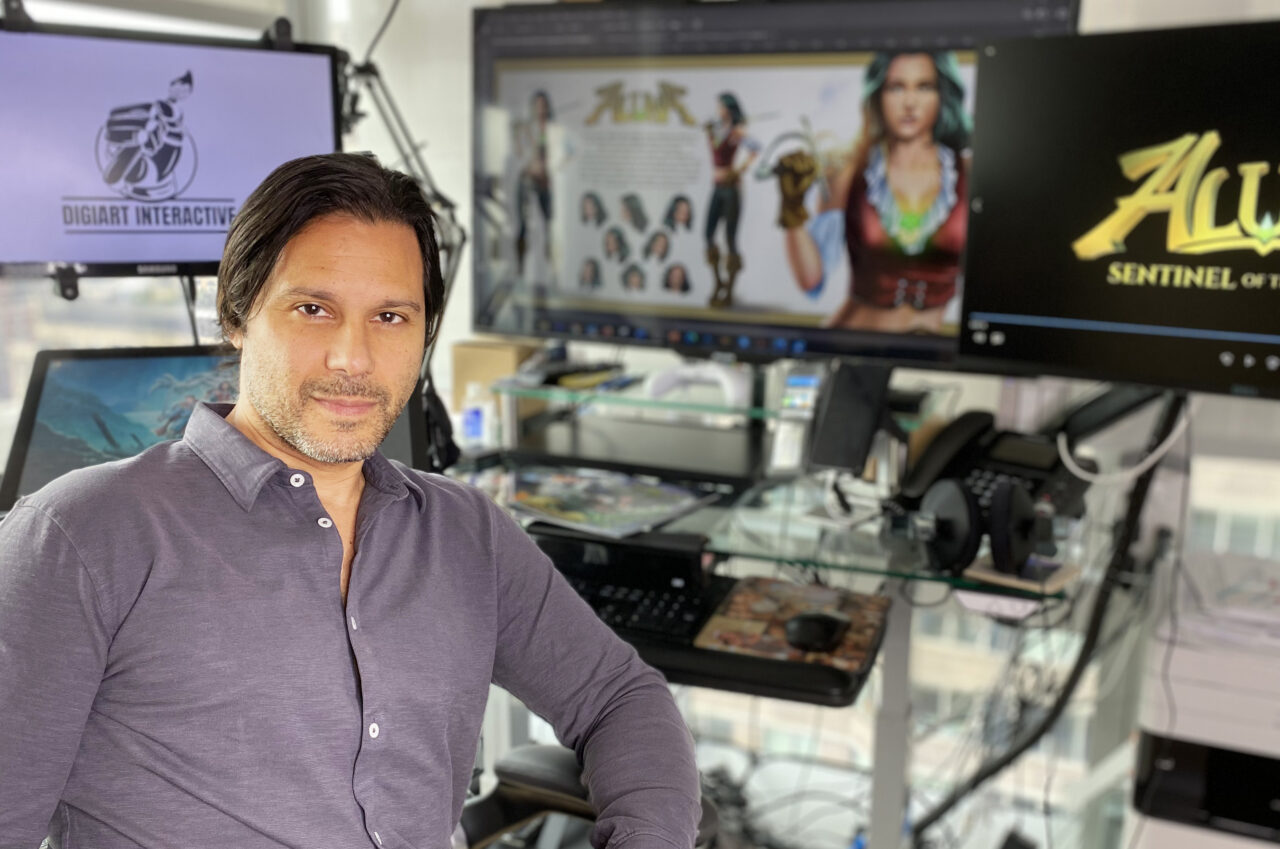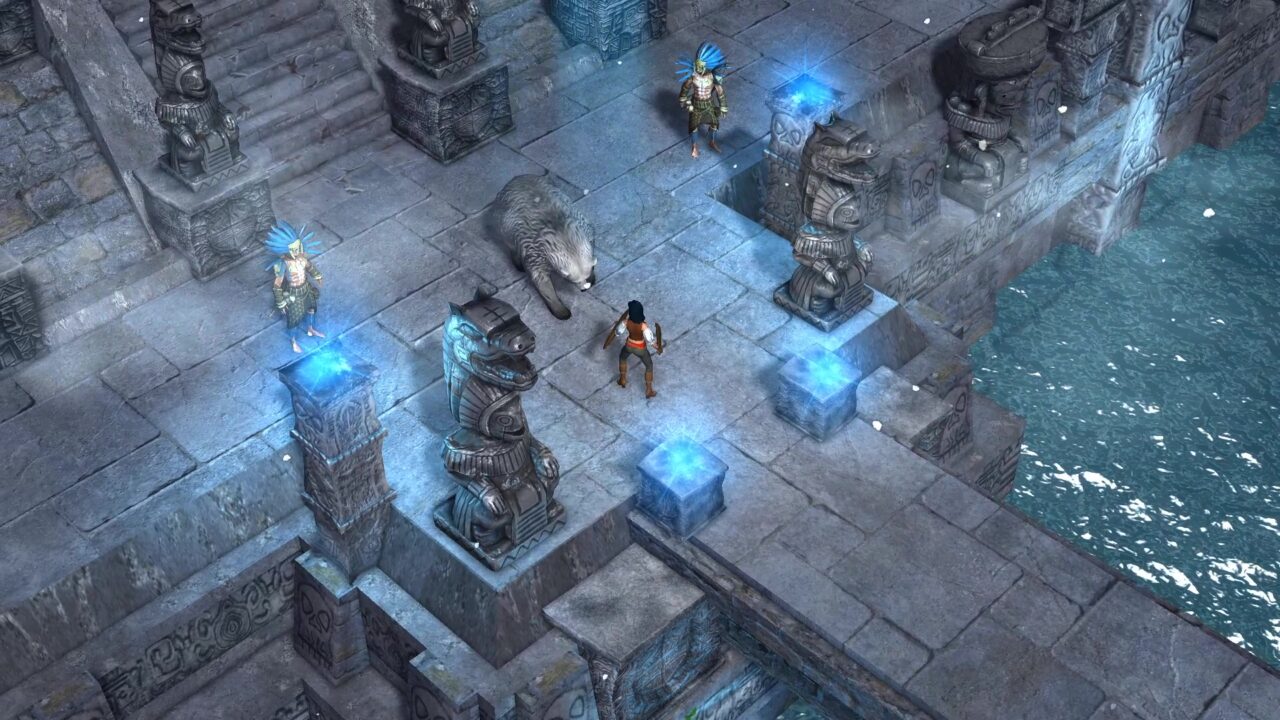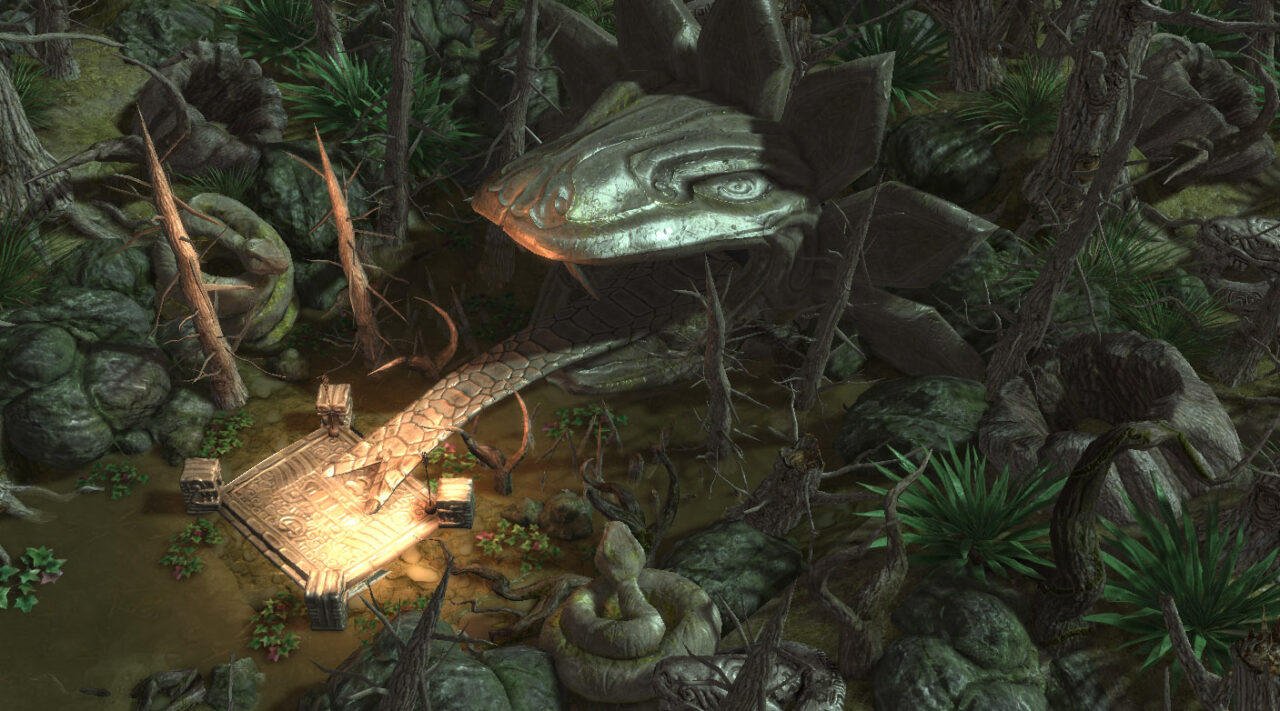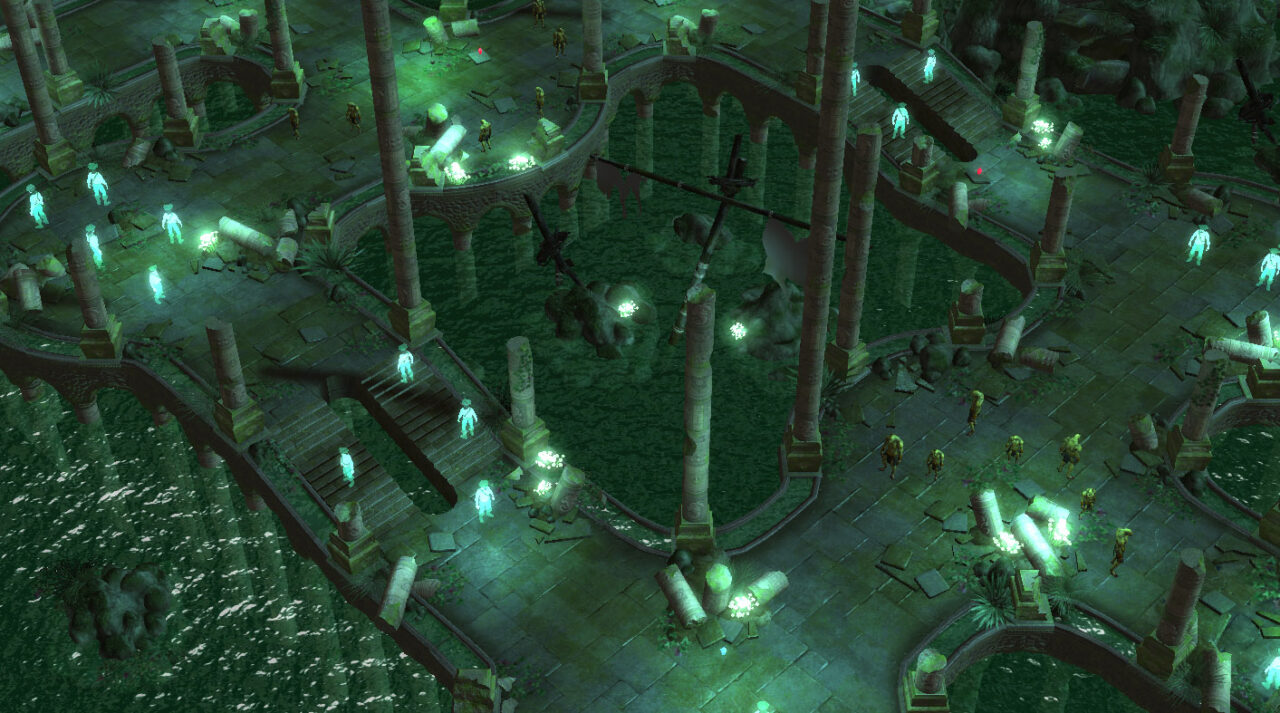HISPANICS IN GAMES – Aluna: half Spaniard, half Indigenous Goddess, 100% pure kickass

Welcome to another entry into HISPANICS IN GAMES, a column dedicating to positively highlighting and celebrating Hispanic heritage in video games. Today, I have the absolute pleasure of talking to Digiart Interactive and Paula Garces. They’ve been working on Aluna for years. A character co-created by Paula Garces and Antonio Hernandez, Aluna is a Hispanic heroine, fighting to keep her land, and her people, safe from threats (both human an supernatural). The story of how the character came to be, and what it took for this game to get made, is inspirational, incredibly moving, and provides a unique insight into how the game industry works. Let’s get to it!
Dread XP: Can you provide a brief studio bio, how you came to be, and why diversity is important to what you do?
Antonio Hernandez Producer/Development Director – Digiart Interactive – Well, we have been working on Aluna for years. Aluna was part of a comic book series that I co-created with actress Paula Garces to leverage the playing field of misrepresentation of females and minorities in the entertainment industry. It didn’t take long for her to be introduced as a hero avatar on the online battle arena platform Heroes of Newerth (HoN). After a meeting with Jeff Birns, CEO of N–Fusion Interactive an Award winning independent video game developer company (1979 Revolution:Black Friday, Ember, Airmail), we knew which direction we wanted to go. His knowledge and experience in the gaming industry really impressed us, Digiart Interactive was born. We quickly decided to look beyond just creating one title. Digiart will also be focusing on publishing other titles as well. Our goal at the end of the day is to bring fourth great titles that focus more on compelling stories and gameplay with heroes that represent all ethnicities. We have a diverse team of artists, coders and musicians working with us from around the world. Aluna will be one of many titles we will introduce to the world.
DXP: What is the difference in perspective afforded to you by being members of different minorities working within the gaming industry?
Antonio Hernandez (American/ Puerto Rican roots) – Producer/Development Director – It’s hard for me to step outside the box and look inside through a window and assess our team by ethnicity. For me it’s more about the talent that each person brings to the table. I was raised in Chelsea Manhattan in NYC in the early 70’s. My neighborhood was mixed with all ethnicities. So as a child, when we created a pick up team for baseball or football, we picked our team players by their skills. Each team was a mix of Spanish, Black, White and Asian. I still go by this format when choosing my workers. Now if you ask me, is it a plus to see those that are normally overlooked because of their ethnicity, apply for a job with us? I would be lying to you if I said no … That being said you can see my amazing team quotes below.

Tyler Munden: Lead Designer ( American) – “I really enjoyed developing a game based on historical real world locations and lore. Additionally, we had a lot of freedom to add supernatural aspects to the game’s story based on mythology.”
Juan Pable Naranjo ( Mexico) – Music Director – “To be honest, being a member of a minority has not altered the experience in any way. That’s not to say this is not an important statement, but think about this: goals, methods, work… everything is exactly the same as with any other project, and that is perfectly fine. I believe that is exactly the way it should be. Professionalism is the same, whether you are part of a minority or not. Respect your coworkers, respect the industry, respect yourself. Do great work and great things will follow.”
John Andrew ( South Africa) – Special Effects Director – “Before joining the Aluna team, I hadn’t realized just how underrepresented some minority groups and women (specifically within the Latino community) are in video games and comics. As a South African and having grown up in a culturally diverse country, with content catering for all ethnic groups, it’s something I had previously taken for granted. Working in a mixed team, which is passionate about bringing the community and its rich history out of the sidelines and creating a game which both serves and represents it, has been a wonderful, illuminating experience. It has also afforded me a more critical view on the thoroughly Westernized offerings we lap up as gamers, viewers and comic fans.”
Alivon Ortiz ( Mexico ) – Colorist – The gaming industry has allowed me to change from being a project-based worker to feeling part of an occupational community with its own identity, in which there are no borders or nationalities. Working with people who have different perspectives is the key to creating final products that are unique. I think it has been quite an enriching experience.
Fabian Tunon Benzo ( Colombia) – Comic Artist – “It is a great commitment and satisfaction to participate in the production of a great comic character of Latin American origin, to provide variations in the costumes and in the graphic image of the main and secondary characters that will continue to be used in the future. I think it is a great hit in my career as an artist of “sequential art”.
DXP: Do any of you have experience working in the wider industry? If so, what was that like when it comes to representation and equality?
Well, we started out by developing an Aluna comic book, where she’s a half Spaniard, half Indigenous Goddess from South America. It wasn’t easy to pitch her as a hero to anyone in the comic book industry. I mean – a green man or a human with fish scales or wings would have been an easier pitch! We had to self-publish her ourselves at first to get noticed. Even now when we pitch Aluna as a live action TV show to networks, we get “cool story, butttttt, we are not ready for this.” Months would pass and we see very similar stories being developed, but with non-hispanic characters being produced. I have to sit back and say to myself, “REALLY?!!!” Hopefully soon everything will balance out and everyone has a chance to compete from an even playing field. Until then, baby steps!!!
DXP: What is it like to be a Hispanic/Latinx games developer in the US?
Antonio Hernandez – Producer/Development Director – Digiart Interactive – It’s awesome to be in this industry. Being able to watch words and art come to life interactively is truly magical. We are just a speck in an ocean of talented Latinx developers in this industry. I have met quite a few in my travels. I’m pretty sure that if you look at most AAA titles out there, there is credit with a Latinx name. Whether it’s an artist, a coder, a musician, writer, you will likely see a Latin name in the mix. To be Latinx and leading this team, wouldn’t be possible without all the others that paved the way.
DXP: What do you hope to achieve by developing games which have an emphasis on social issues and representation?
The main social issue we wanted to tackle was simply representation. Latinx people are frequently portrayed poorly in western media, and we wanted to show the world that there’s a rich, beautiful culture from Latin America that’s often overlooked in the media.
DXP (For Paula): You have decades of experience working within the entertainment industry, from 1995’s Dangerous Minds, to CSI: Miami, The Shield, and more. How do you feel the perception around Hispanic culture has changed (if at all) in the past few years in Hollywood?
Paula Garces: I see more opportunities available for Latinx talent. I do think Networks are consciously trying to be more diverse in casting and other areas but there’s still a long way to go. We see more Latinx families being represented on shows, like the one that I’m currently on right now, Netflix’s On My Block. I don’t think the opportunities for Latinx talent are equal yet but at least the conversations are seriously being had in all businesses, not just Hollywood.

DXP (For Paula): What does it mean to you to be working with a team that is focused on positive representation?
PG: It’s awesome! Everyone on my team is careful and sensitive about making sure details and visuals are represented in its true vision. Everything is run by me first. Aluna’s origins are set back in the 16th Century, so trying to represent that geography while keeping in mind all the injustice indigenous people faced in the hands of the Spanish Conquistadors was a hard balance, but one we were willing and excited to face head on. It is very important for the Aluna Team to highlight an indigenous superhero.
DXP (For Paula): Aluna can be credited with bringing a Latinx woman to the forefront of indie action comics in recent years. What is the coolest story about an Aluna fan reaching out to you to tell you what the series has meant for them?
PG: Well I remember going to Comic-Con a few years ago not knowing what to expect in regards to fans showing up. A lot of guys who were fans of the Harold and Kumar movies and the Shield were in the front of the line to meet me. I’ll always remember when a beautiful family (a mom, dad and little girl ) was waiting next in line to meet me. I thought I was going to sign the book for the father, then he stepped to one side and the little girl stepped forward and told me how she was so excited to have a superhero that she can relate to. It really meant something for me to sign her book. I could remember myself being her age and not having a hero I could call my own. It was a sweet moment!!
DXP (For Paula): We have a sister site dedicated to covering films and television. How do you feel about Netflix and their efforts in increasing representation? Do you feel there’s a real intention being made there? And if so, is that intention echoed somewhere else (other streaming platforms/networks)?
PG: As of right now I can only speak about my experience with my current employer, Netflix. Netflix and showrunner Lauren Iungerich of On My Block are amazing! You can go to Netflix at any time and see how diverse they are. They are on the forefront of taking chances and showing shows and movies of all ethnicities from around the world. Like I said before, doors are opening and stories of all types are starting to pop up. I do think the success of shows like On My Block who feature Latinx and African American talent are key and extremely important to moving forward “The Movement” of equality to all humans. It is vital that everyone support producers like Lauren Lungerich who are consciously opening doors for all kinds of talent and bringing stories of all kinds to the forefront. It takes a village to tell a story, and there are a lot of good people out there trying!
DXP: What do you hope to achieve by releasing Aluna: Sentinel of the Shards? What would be the ultimate goal?
We hope to create a superhero franchise that can be story-driven and fun. Aluna Cortes is a female Hispanic hero that carries the blood of a indigenous Goddess inside her. Like everyone in our team that worked on this project, you will probably do a little history search after reading her story. If that happens, we have achieved our goal!
DXP: Do you have a message for Hispanic, Latinx and members of other minorities, hoping to make a career out of creating content focused on positive representation?
Yes, it’s a tough road ahead as you will get a lot of “Well it’s cool, BUT… “ Don’t let that stop you. Keep on the path and stay strong! Set your goals in baby steps and see them through by checking them off one by one. Be proud of every goal you checked off as that alone is an accomplishment. Hopefully it will fall on the right hands and another great story is out there for the masses to experience.
Paula Garces Social Media
- Instagram @therealpaulagarces
- Twitter @paulagarces1
- www.facebook.com/officialpaulagarces
Aluna: Sentinel of the Shards Social Media
- Twitter https://twitter.com/AlunaSuperhero
- Instagram https://www.instagram.com/alunasuperhero/
- Facebook https://www.facebook.com/AlunaSuperhero/
Categorized:Editorials Interviews





